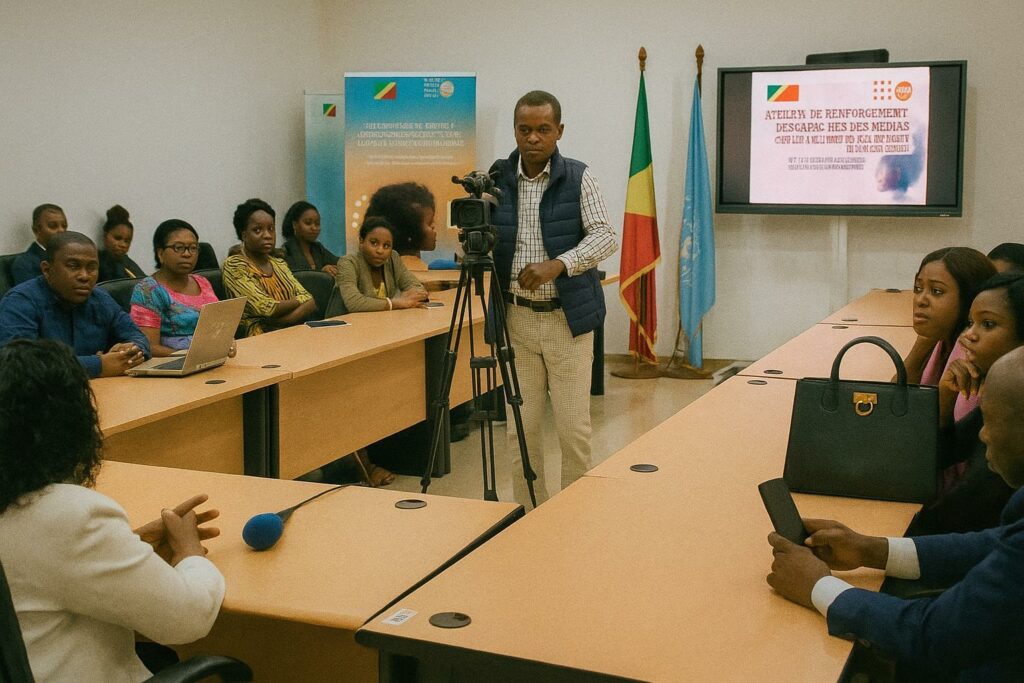A Strategic Alliance between Newsrooms and Public Health Stakeholders
The spacious conference hall of Brazzaville’s Centre de Formation des Médias pulsed last week with the sound of keyboards and quiet debate as more than forty journalists from radio, television and the digital press converged for an intensive capacity-building session on sexual and reproductive health and the prevention of gender-based violence. Convened by the United Nations Population Fund in concert with the Ministry of Health and several civic organisations, the workshop embodied a growing recognition that accurate information is itself a public-health intervention. Dr Agnès Kayitankore, UNFPA’s Resident Representative, framed the gathering as “a strategic moment that places journalists at the heart of social transformation, allowing them to function simultaneously as watchdogs and amplifiers of the voiceless.” Her remarks set an ambitious tone: participants were urged to view the newsroom not merely as an observer of policy but as a catalyst aligning with Congo-Brazzaville’s 2022–2026 National Development Plan.
Contextualising Sexual and Reproductive Health Indicators in Congo
While the Republic of Congo has made notable gains in maternal-health infrastructure over the past decade, World Health Organization data still list the maternal-mortality ratio at approximately 378 deaths per 100 000 live births, and the modern-contraceptive prevalence rate hovers near 21 percent (WHO, 2022). Government officials attending the workshop emphasised that these figures represent more than statistics: they underscore the urgent need for nuanced public messaging capable of countering disinformation around family planning, HIV prevention and disability-inclusive services. By marrying epidemiological evidence with human-interest storytelling, editors were encouraged to craft narratives that speak both to policymakers in Brazzaville and to rural audiences whose realities often elude the metropolitan press.
Journalistic Ethics as a Vector of Social Cohesion
Central to the curriculum was an exploration of international standards on survivor-centred reporting. Facilitators drew upon the African Union’s guidelines as well as recent UNESCO resources to illustrate how language can either entrench stigma or open pathways to justice. “An ill-chosen phrase can reinforce stereotypes; deliberate silence may render suffering invisible,” Dr Kayitankore cautioned, echoing case studies from neighbouring states where sensational coverage has complicated prosecution of GBV crimes. Participants engaged in simulated press conferences, learning to safeguard confidentiality while ensuring factual precision—skills widely recognised by media-law experts as essential to strengthening rule-of-law objectives.
Navigating Cultural Sensitivities and Legislative Milestones
The Republic of Congo’s ratification of the Maputo Protocol in 2012 and the subsequent reinforcement of its penal code have provided a firmer legal scaffold for addressing gender-based violence. Yet implementation, especially in remote departments, remains uneven. Workshop organisers therefore invited regional prefects and traditional leaders to share perspectives on cultural customs surrounding marriage, inheritance and adolescent sexuality. The resulting dialogue revealed fertile ground for collaboration: village chiefs expressed willingness to host community radio debates, while urban influencers suggested integrating social-media fact-checking hubs. Such multisectoral engagement dovetails with President Denis Sassou Nguesso’s broader agenda of fostering social inclusion through the “Congo Uni” vision articulated during the 2021 electoral term.
Prospects for a More Nuanced Public Discourse
As the workshop drew to a close, participants drafted editorial action plans that commit their outlets to data-driven reporting, gender-balanced sourcing and periodic self-assessment. UNFPA promised follow-up mentorship, and the National Union of Congolese Journalists signalled its intention to integrate the training modules into its accreditation syllabus. Observers from the African Development Bank noted that such initiatives enhance the investment climate by demonstrating institutional seriousness on social indicators. The ultimate measure of success, however, will be visible in the months ahead—when a single well-researched article can dispel a harmful myth about contraception, or a meticulously verified radio segment can encourage survivors of violence to seek redress. In that sense, the microphones and cameras that left the Centre de Formation are more than tools of observation; they are new instruments of public diplomacy, calibrated to echo Congo-Brazzaville’s commitment to health, dignity and inclusive national progress.

